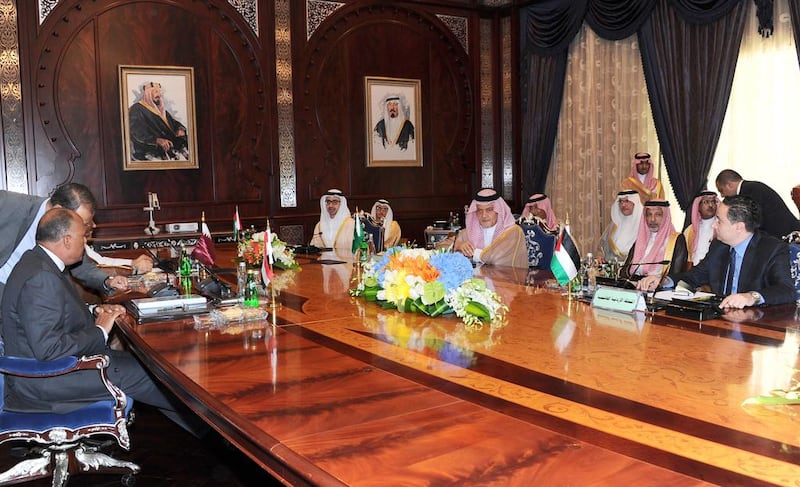ABU DHABI // Arab foreign ministers agreed on Sunday to face challenges posed by the Islamic State and other regional crises as they pledged to maintain “security and stability” in their countries.
Foreign ministers from the UAE, Saudi Arabia, Qatar, and Egypt attended the meeting, held in Jeddah, along with an adviser to Jordan’s foreign minister. Meanwhile, in Baghdad, Haider Al Abadi, Iraq’s new prime minister, also held talks with Iranian foreign minister Mohammed Zarif about international efforts against the group.
The meetings are aimed at finding a unified approach to combating the Islamic State, which is recognised as a top threat to international security.
Since capturing large areas of Syria and Iraq over the past year, the group has declared a caliphate that it intends to expand across the region and drawn thousands of militants from around the world to its cause.
While few details of the meeting were released, the ministers agreed on “the need to seriously work to deal with these crises and challenges to preserve security and stability in Arab countries”, according to the Saudi Press Agency.
Analysts said it was likely the ministers discussed ways to prevent funding from reaching the Islamic State and stopping their citizens from travelling to join the group.
Gulf leaders are concerned about the possibility that citizens who have joined the Islamic State might eventually come home and carry out attacks, said Dr Theodore Karasik, director of research and consultancy at the Dubai-based Institute for Near East and Gulf Military Analysis.
“These people are being monitored,” he said.
Gulf leaders are also concerned about citizens still living in their home countries who are sympathetic to the group. Citing Gulf officials, Mr Karasik said that senior Kuwaiti clerics have held meetings with Islamic State representatives in Syria and Jordan to coordinate the delivery of funding.
“There is a certain allure of another type of governance that is appealing to some of these people, particularly in sub-tribes that are not in good standing with their governments. You find that in Kuwait and northern Saudi Arabia.”
Mr Karasik said that these factors have given governments a particular resolve to combat the Islamic State.
Abdulkhaleq Abdullah, a professor of political science at Emirates University, said the immediate response to the Islamic State must be to help Iraq and Mr Al Abadi.
“The unity of Iraq is important,” Mr Abdullah said. “Once you have an Iraqi government that is accepted by everyone that is almost halfway. It is a good thing there is a regional effort.”
The current GCC dispute between Qatar and the UAE, Saudi Arabia, and Bahrain was expected to be discussed at a separate meeting on Sunday, reported Saudi-owned newspaper Asharq Al Aswat.
Foreign ministers from the UAE, Saudi Arabia, and Bahrain would meet “to formulate the final positions of the three countries regarding Qatar,” according to the newspaper.
Some analysts believe that sanctions could be imposed on Doha because the other countries say it has continued to interfere in their internal affairs.
jvela@thenational.ae
* with additional reporting by Reuters





